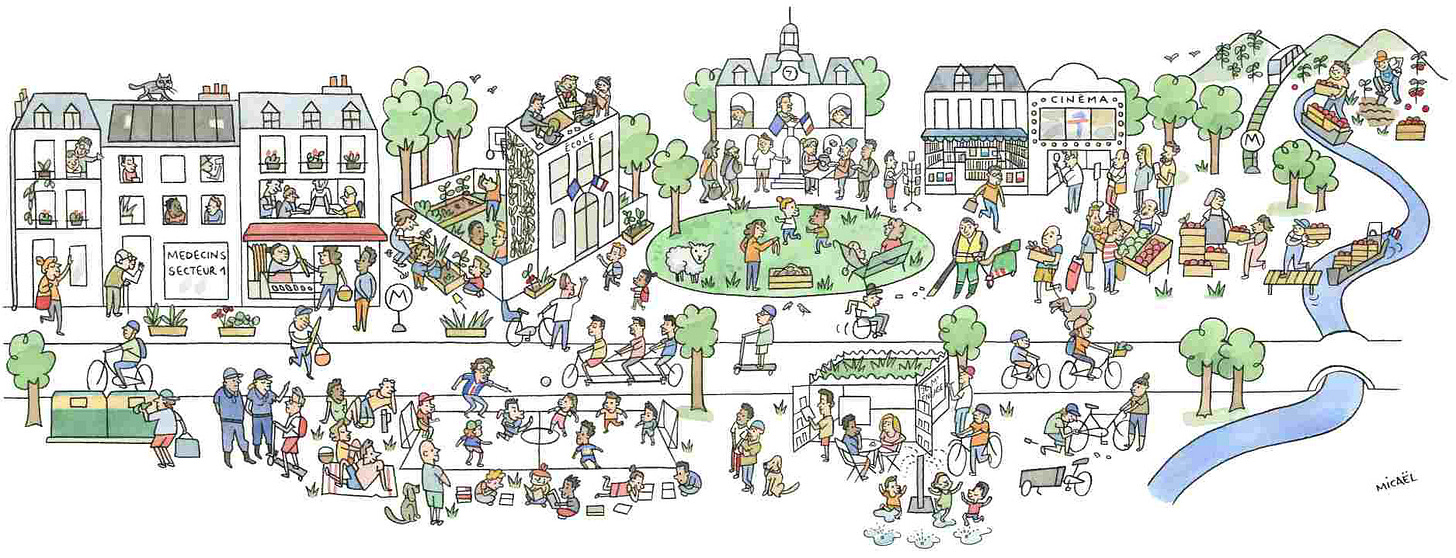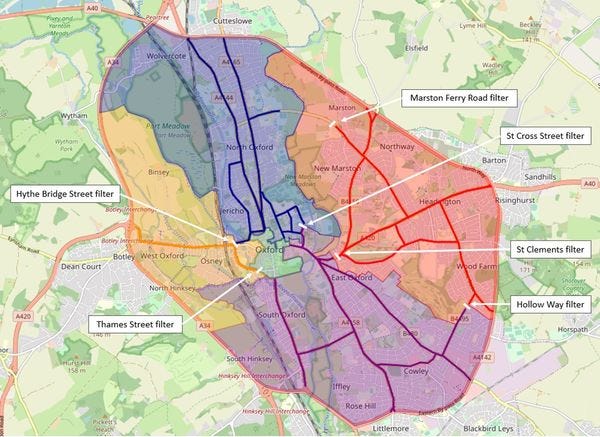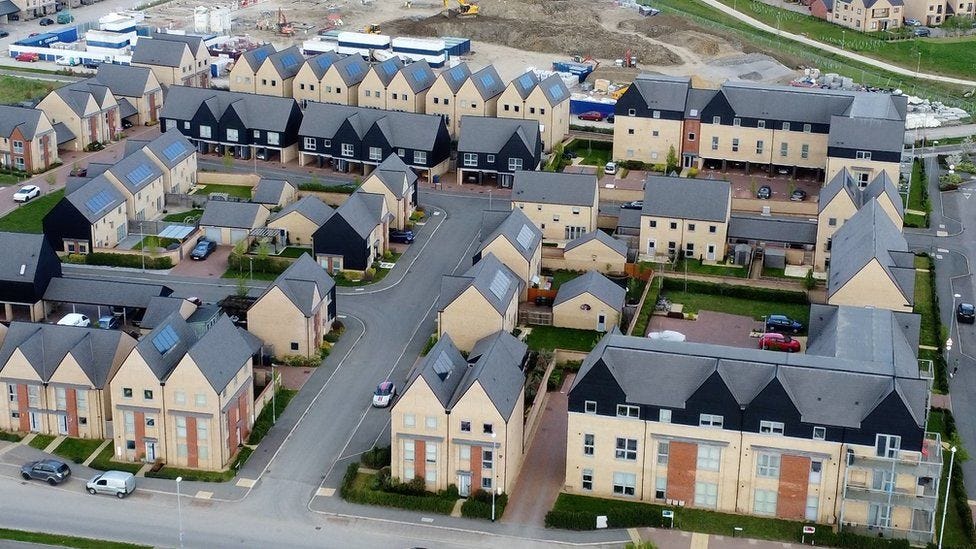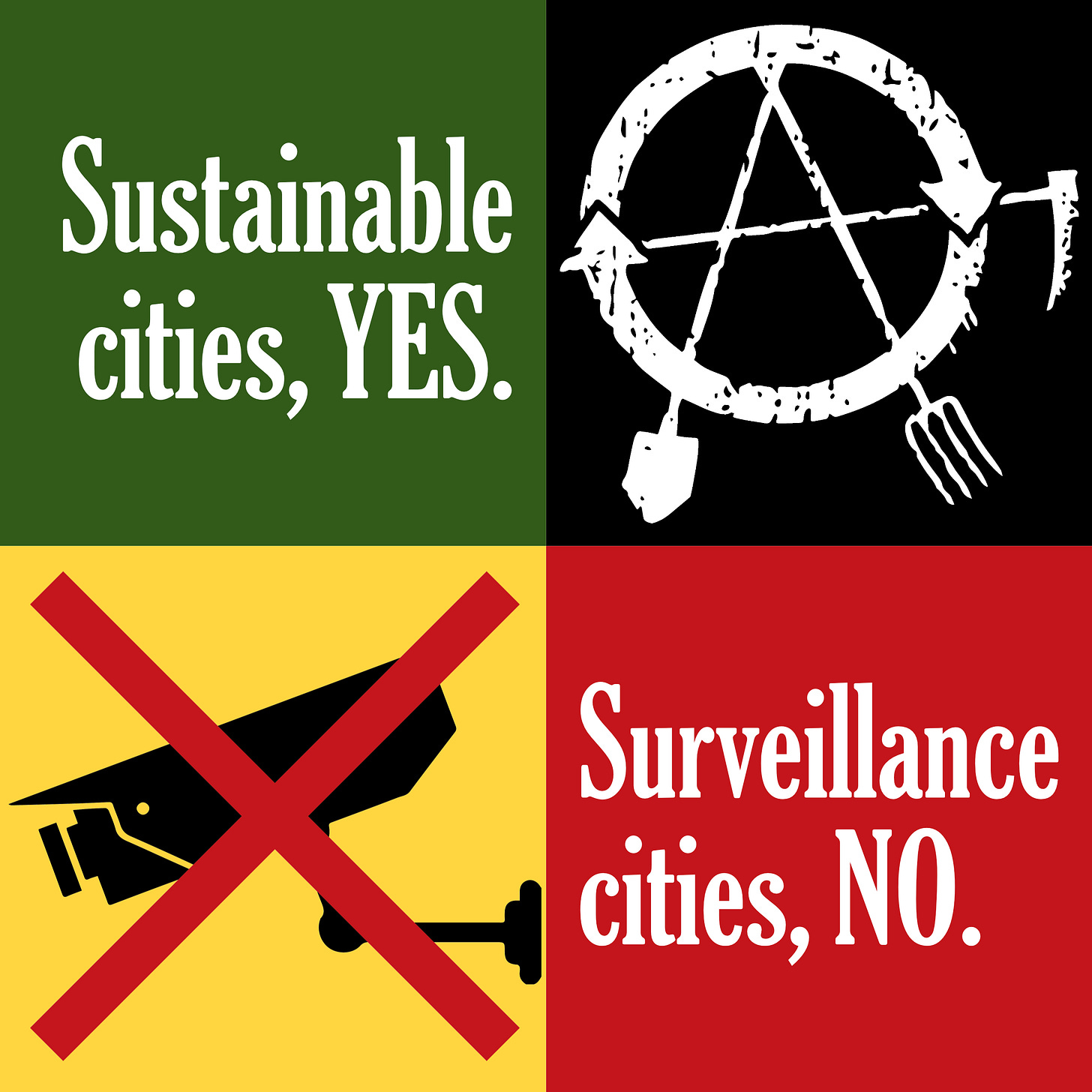It has come to our attention that the originator of the concept of 'fifteen minute cities', one Professor Carlos Moreno, is visiting Oxford in February to present and discuss the concept in a two hour long event: Urban Futures - the proximity revolution. An introduction to the 15 minute city concept by its founder.
Prof Moreno’s lecture focuses on the 15-minute city concept, a groundbreaking approach in urban planning aiming to create urban environments where all essential needs are met within a short perimeter on foot, bike ride and decarbonized mobilities This concept is rooted in reducing reliance on motor vehicles, decreasing carbon emissions, and enhancing the quality of life in urban settings.
The choice of Oxford as the location for this presentation pretty much guarantees that if this event is genuinely open to all, there will be an 'interesting' discussion. The reason being the long held ambition of Oxford City Council to divide the city into zones, introducing traffic filters and other measures in a bid to reduce overall vehicle movements, and move towards becoming a fifteen minute city. A move that has generated a lot of controversy:Anger after travel chief announces traffic filters are 'going to happen, definitely' ahead of decision - Oxford Mail | 27.10.22. There have been protests against the imposition of these measures: Five arrests as thousands protest in Oxford against LTN '15-minute cities' - itvX | 19.2.23. The large protest mentioned in this piece was bizarrely counter-protested by so called 'anti-fascists' who had swallowed all of the propaganda about those questioning fifteen minute cities being 'right wing conspiracy theorists'. We know that Bristol based 'anti-fascists' were involved in the counter protest. If any of them would like to explain to Stirrings from below why they may think we're 'right wing conspiracy theorists', we're all ears and would welcome a discussion:)
As a brief aside, yes, there were a few alt-right elements hanging round the fringes of the protest in Oxford in February 2023. It was the same with the anti-lockdown and anti-vaccine mandate protests. As with any newly emerging social movement that doesn't fit neatly into the increasingly outdated left vs right divide, there will be ambiguities and contradictions. To airily dismiss these protests and emerging social movements as alt-right or even 'fascist' is an intellectually lazy and downright dishonest way of avoiding any discussion about the legitimate concerns raised about lockdowns or the ham fisted attempts to implement liveable neighbourhoods and fifteen minute cities. Much of this is explained here: The abuse of a term 11.3.23.
How the controversy about the concepts of fifteen minute cities and liveable neighbourhoods has descended into an increasingly bitter culture war is dealt with in this very insightful piece: Oxford 2024 - Alex Klaushofer | Substack | 13.1.24.
It's all got very tribal with a refusal to even listen to, let alone engage with, any legitimate concerns about the way these schemes are mooted and implemented.
So how are we going to get out of this civil strife which risks dividing citizens physically as well as ideologically?
Here’s a thought, in fact, three. Firstly, if we have the slightest desire to have a peaceful society with any level of maturity we need to stop engaging in a childish public arguments consisting of name-calling and wilful misunderstanding. Secondly, we need to separate the issue of traffic restrictions from the complex question of how to create flourishing neighbourhoods and live in greater harmony with the earth.
The third thought, while somewhat old-fashioned, sounds radical in these coercive times. How about shifting the attitudes and emotions underlying the control-and-punish approach and replacing them with respect and trust for our fellow humans? What if, instead of spending millions on cameras and administrative systems to issue permits and fines, councils used that money to seed local community projects? Just imagine, instead of corralling, prohibiting and infantilising, the good that could come from citizens giving free expression to their own inner authority and creativity.
Why this unthinking, reflexive tribalism has emerged is a complex issue to deal with here, but it may be something I'll look at some time in the future.
I've mentioned this before but, it's worth repeating. The two of us behind this project don't drive. We rely on public transport and walking to get around. Back in 2022 when we relocated from Thurrock in Essex down to Keynsham which is between Bristol and Bath, we had a number of criteria that had to be met when it came to finding a place we wanted to live in. They included ease of access to a decent range of shops, health care, rail and bus links. A bonus was being close to a decent park and ideally, open countryside. Essentially, we were looking for our fifteen minute neighbourhood.
When we started to apply those criteria to areas in and around Bristol and Bath, we soon found that the number of suitable areas was actually pretty small. Even when we finally focused on Keynsham as being somewhere we would want to live, given the way it has been allowed to develop, being non drivers, there was only about a third of the town that was actually worth looking at. The good news is that we did eventually find somewhere very close to the town centre and railway station to live. The one downside is that it's right next to the bypass carrying the A4 round the town centre!
The point I hope I'm making is that we have to deal with the world as it is. There are many inner suburban and city areas that because of the way they have developed, do effectively function as fifteen minute neighbourhoods. However, when you get to the outer suburbs and the overspill towns, because of decades of planning policies based on the assumption of near universal car ownership, they've been allowed to sprawl in a way that makes car ownership pretty much essential. This is not the world we chose, it's the one we've been landed with and have to adapt to and survive in as best we can while trying to live a meaningful life.
Unless there's a serious attempt to address planning policy, this is the world we're going to be stuck with for a fair while to come. Seriously addressing planning policy means not allowing a new town to be built and leaving the development of a town centre with shops, cafes, bars, a library and healthcare facilities until well into the construction of the housing: Northstowe: The broken-promise new town built 'with no heart' - BBC Cambridgeshire | 12.7.23. It also means large new developments having decent public transport links. Until this can be addressed, any talk about fifteen minute neighbourhoods is pie in the sky.
People aren't mugs. When on the one hand, they see planning policy allowing developments to go ahead where car ownership is a necessity and on the other, they're subjected to schemes that would in effect control and limit the way they can drive around towns and cities, don't be surprised when they start to ask difficult questions! They can see the total lack of joined up thinking and the blatant contradictions. In the wake of the erosion of trust in authority after the Covid 'crisis' lockdowns, it's hardly surprising that they're going to view the coercive implementation of fifteen minute cities and liveable neighbourhoods with a degree of scepticism.
Most people are reasonable and will agree that in an ideal world, there are positives in having as many of life's amenities as possible within a fifteen walk. They would most likely want to live somewhere where there's a genuine sense of community. They'd probably also agree that long commutes, whether by car or public transport, are a pain in the arse and it would be much better if work was closer to home. Having said that, they also want the freedom to be able to travel to see relatives and friends, drive out to the countryside or visit an entertainment venue, without having to pass through what can best be described as virtual toll gates, or accept a limit on how many times such journeys can be made.
It's the coercive aspect and the message it sends that basically, people can't be trusted and have to be nudged and pushed into patterns of behaviour deemed to be 'socially acceptable' which raises people's hackles. When you set the nudging, pushing and coercion against the seeming lack of effort in reconfiguring and building neighbourhoods where a lot of life's amenities are actually within a fifteen minute walk, along with the abysmal state of public transport, it's pretty clear there's an almost unbridgeable gap. If no serious efforts are made to address that gap, don't be surprised when people start to ask awkward questions about what's being done to them and more importantly, why it's being done to them.










I hate spending more than 15 minutes in just about any city.
The little town (5000 pop) where I grew up and went to school, was a sustainable farming town. There was a grocery store at the north end of town and store near the square that covered the south end of town. The town is still there, but has only one grocery store. It could be a 15 minute retirement community, but the city councilmen are morons. they don't provide any reason for young people to stick around.
I live in another small town now, that could be a 15 minute community, except it needs a grocery store, a couple more places to sit down and eat, and a nice park, closer to the center of town.
If I were to design a sustainable (15 minute) community, I'd start with the courthouse, then around the square, I'd place clothing stores, book stores, restaurants, cafe's, a couple of doctors offices, a grocrey store, and a nice park. From there, in a square pattern, I'd build houses around the square in two to three rows, then another park, a few cafe's on the perimeter, then more houses, then a small hospital and another grocery or convenience store, All the schools in one place, etc. etc.
It's not hard to figure out how to build a nice little community, the problem is in doing it right.
The way they are doing it now is not right. You can't take an established town and chop it into 15 minute zones.